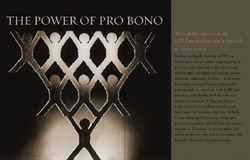The Power of Pro Bono
With public interest work, GW Law students pay it forward.
By Carrie Madren
Students and faculty members at GW Law School have a long tradition of participating in pro bono work that leads to law reform, helps disadvantaged individuals and minority groups, and builds community. Pro bono—short for pro bono publico, meaning “for the public good”—is increasingly an important vein of GW Law education, with benefits for both volunteer and service recipient.
This year, there is a new incentive for students to rack up pro bono hours: In September, first lady Michelle Obama challenged The George Washington University to perform 100,000 hours of community service. If students, faculty members, and staff members meet the goal by this spring, the first lady will speak at Commencement.
In the Law School, both community service work, such as working in a soup kitchen, and pro bono work, which engages legal skills, will count toward Mrs. Obama’s challenge.
“The pro bono experience is an important part of legal education because it gets students out into the community and gives them a sense of what they can do to help out,” says Alan Morrison, Lerner family associate dean for public interest and public service law. Each year, law students record about 4,000 hours of pro bono work. Students who do more than 60 hours of pro bono work during their student careers earn recognition at graduation; last year, about 40 students completed the 60 hours.
This year’s first-year class is primed for pro bono service. In fact, the newcomers showed more interest in pro bono work than any previous first-year class, and the fall pro bono fair saw the largest turnout in history, says GW’s pro bono coordinator, Tamara Dévieux-Adams, who adds that students asked her early in the year to figure out a good pro bono fit.
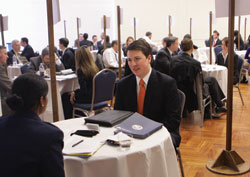
Some volunteer work leads to career opportunities. In conjunction with Georgetown University Law Center, the GW Law Career Development Office holds an annual interviewing program with public interest organizations, government agencies, and legal services offices.
Anne Wernikoff
Students serve at organizations ranging from the Animal Welfare League to the American-Arab Anti-Discrimination Committee, Amnesty International, Legal Counsel for the Elderly, Sexual Assault Legal Institute, the D.C. Earned Income Tax Credit Campaign, the D.C. Bar’s small business legal clinic, and more. Other GW-based programs include the Animal Welfare Project and the Criminal Justice Reform Projects, in addition to the Law School’s many in-house clinics. Student organizations have their own programs: Street Law and the GW Environmental Law Association for the Anacostia Watershed Society, to name a few.
Pro bono tasks range from legal research to working on an ongoing case, drafting motions, legal counseling, and other law-related work. For example, at the Capital Area Immigrants Rights Coalition, students work with individuals who have been detained by immigration authorities in the D.C.-metro area, interviewing detainees to aid attorneys in determining which cases to take on. In the Street Law Program, law students teach D.C. youth about the law and coach students in a mock trial.
“Students get outside the classroom, and they see how the law impacts real people—mostly real people who cannot afford a lawyer otherwise,” Dean Morrison says.
At GW, law students have no requirement to do pro bono work, but they are highly encouraged by faculty members and student groups. A pro bono fair early in the year helps plug students into volunteer work, but Dean Morrison says more needs to be done by the Law School to introduce students to new organizations and causes, as well as to facilitate the pro bono process for the students.
“It’s a natural way of building your network of contacts,” Ms. Dévieux-Adams says, adding that it helps to have people in the community who can vouch for students’ work. “That provides a fantastic reference, even if you’re looking for a job that has nothing to do with the kind of volunteer work that you did.”
More than contacts, students start a pattern of service that can stay with them throughout their career.
“I would like every student to leave with what I call the ‘pro bono habit,’” Dean Morrison says, “so that no matter what they choose to do—that includes working for the government as well as a law firm or corporation—they will consider that part of their life is doing pro bono work in the legal field every year,” he explains.
“If you get started with the pro bono habit in law school, it’s easier to continue it,” Dean Morrison adds, “and see what it gives to other people and see what it brings to yourself.”
Striving for Criminal Justice
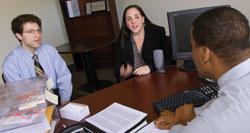
Law student Claire Duggan, BA ’98, helps to lead the Criminal Justice Reform Project. She received her training from D.C. Office on Ex-Offender Affairs staff, including former Director Rodney Mitchell, JD ’02, (right) and classmate Jesse Weiner, JD ’09, (left).
Doug Plummer
After earning her GW undergraduate degree, Claire Duggan moved to Georgia for work and, through Hands on Atlanta, began volunteering as a tutor to incarcerated children and teenagers in a state prison.
“It was really eye-opening,” says Ms. Duggan, a part-time GW Law student. “The whole point of being locked up is to literally have your free will taken away, and it was difficult to see kids living in these hard conditions—some who deserved punishment, most who didn’t.”
Ms. Duggan, who is also associate director of public relations at GW Law School, now helps to head up the Criminal Justice Reform Project, which is in its third year. Originally, the pro bono program started as Project Re-Entry, “but we realized that there were so many more issues than just re-entry that we wanted to address,” Ms. Duggan says. The biggest initiative so far has been a research project where students researched other jurisdictions that have had success using alternatives to incarceration for nonviolent drug offenders; Ms. Duggan was one of more than a dozen students who helped with this research under the direction of Professor Donald Braman.
During summer 2008, Ms. Duggan performed pro bono service work at the D.C. Office of Ex-Offender Affairs, counseling clients just out of prison. Ex-offenders get counseling on housing and employment issues at the D.C. office. “If you have a felony on your record and you are indigent, you can’t qualify for government housing, you can’t live with someone who has government housing, and jobs are hard to land,” says Ms. Duggan, who volunteered 10 hours a week.
“D.C. has some unique challenges in its criminal justice program,” Ms. Duggan explains. “Most D.C. inmates go into the federal system, so you can be sent away as far as California. There is a loss of communication between inmates and their families and communities, which just creates bigger problems and does not promote better
public safety.”
Ms. Duggan found pro bono work at the ex-offender office rewarding but often frustrating. “Most people coming into the office didn’t have computer skills, so they didn’t have a résumé,” she says. “Even for the few people who had a résumé and job experience, it’s hard to find a job even as a dishwasher when you have a conviction on your record.”
Ms. Duggan also conducted mock interviews and helped ex-offenders figure out how to be truthful yet positive in interviews about their prison past.
“Just seeing how resilient people are, dedicated to getting past this label and really wanting to be a contributing member of society,” was rewarding, she says. “It was frustrating seeing the roadblocks, but it was a great experience to help them overcome some of those things.”
Ms. Duggan still volunteers on a small task force of community members who serve as a watchdog group, propose changes to legislation, and testify at hearings.
This semester, she is gearing up for the Criminal Justice Reform Project and has a handful of students signed on to begin writing a report of data the group compiled last year. For extra support, she’ll have guidance from an active group of alumni who helped start the project and will serve as an informal advisory group as well as a networking support for current students.
Ms. Duggan and her advisers have big plans for the future, including hosting speakers to help raise awareness on campus about criminal justice issues, working on a books-for-prisoners project, and teaming up with the D.C. Public Defender Service. Students have also signed up to volunteer with the Council for Court Excellence and D.C. Prisoners’ Project.
Skills she has picked up from her pro bono work with criminal justice issues include research and client counseling skills, and a better understanding of the situations of the incarcerated people she helps.
“You can’t work to fix the system if you don’t know what these people are going through or what the real issues are,” she says. “Pro bono opportunities are invaluable. D.C.’s my community, and it’s the least I can do to dedicate a couple hours a week to this cause.
“I want the system to be fair for everyone; I’ve seen the disparities firsthand, and justice often depends on whether you can afford a good lawyer or any lawyer at all.” The law student says her passion for criminal justice brought her to law school in the first place.
“I knew I was going to learn a lot from pro bono work,” Ms. Duggan says, “but I had no idea how passionate I would become about these issues.”
Working for the People
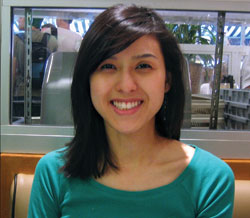
Thanh Nguyen volunteers at the U.S. Department of Justice’s Civil Rights and Human Trafficking Prosecution Unit, where she works on cases involving human trafficking, hate crime, and police brutality.
“A goal for me in going to law school was to figure out a way to give back to people who are disadvantaged,” says Thanh Nguyen, a second-year GW Law student.
Between her undergraduate years at Northwestern University and law school at GW, she spent time working at a nonprofit in Taiwan helping human trafficking victims from Vietnam. “Seeing firsthand the things that people go through, the lack of legal recourse, the lack of international mechanisms to protect people, I thought, ‘This is why I want to go to law school,’” Ms. Nguyen says.
Last year, Ms. Nguyen began volunteering at the Asian Pacific American Legal Resource Center, which focuses on helping economically disadvantaged clients in all manners of legal cases and coordinates volunteer hotlines for every Asian language. Ms. Nguyen’s job was to man the Vietnamese hotline, translating clients’ calls for help and relaying attorneys’ comments back to the clients. Issues range from divorce court proceedings to immigration issues.
Ms. Nguyen, who volunteered about five hours a week, says she took a holistic perspective, dealing with people’s needs beyond legal issues, including housing and food. Calls were confidential, and she and attorneys collaborated on resources to refer to clients.
In one case, a Vietnamese immigrant mother was kicked out of the house by her son, and the mother didn’t speak English. She spoke with Ms. Nguyen, and then later, attorneys asked Ms. Nguyen to translate their advice in a three-way phone call. “The client was breaking down, and it was very emotional,” Ms. Nguyen recalls. “Part of it is translating, but part of it is trying to help them through what they’re going through.”
Ms. Nguyen says her pro bono work has opened the door to D.C.’s public service community, and she is drawing on the attorneys’ years of experience to navigate that community.
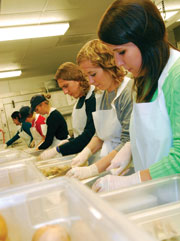
Despite their busy schedules, GW Law students perform hundreds of hours of community service work each year. Here, students help prepare food at D.C. Central Kitchen. The GW Law staff and faculty raised $700 for D.C. Central Kitchen this year with an annual white elephant sale during the Thanksgiving potluck lunch.
Julie Woodford
“You learn about the law and how the law affects disadvantaged people, and about what it is to represent someone who doesn’t have the resources to get legal services from a law firm,” Ms. Nguyen says. At a conference last year, she met someone from the human trafficking prosecution unit at the Department of Justice, expressed her interest, and landed another volunteer gig at the Department of Justice’s Civil Rights and Human Trafficking Prosecution Unit, where she currently volunteers two to three times a week. Her unit prosecutes cases involving human trafficking, hate crime, and police brutality.
Before coming to the Law School, Ms. Nguyen had studied the Kil Soo Lee case, among the biggest human trafficking cases in the United States, while doing undergraduate research and working in Taiwan. At the Department of Justice, she now works with the attorneys who prosecuted the case. “You can ask them all the questions under the sun without feeling like, ‘I should know this already’—this is the time when you can get all your questions answered,” Ms. Nguyen says. She has even found that attorneys ask for her opinion on matters as they discuss cases.
In addition to legal research and memo writing for various trafficking cases, she is also helping attorneys on a highly publicized police brutality case. “I get to learn the strategy of the case from the best and brightest attorneys,” says Ms. Nguyen, who has found herself working alongside prosecutors with more than 30 years of experience. “Having that close contact to such a high-profile case gives you a lot of exposure to the trial advocacy skills that you’d need if you go into this line of work.” It’s a line of work she hopes to follow in her career.
Such pro bono work has equipped her with real life skills, she says, giving context to what she has learned in the classroom. At her pro bono position, she has pondered law questions such as, what happens when a trafficking victim doesn’t want to go back to his or her country? “Those are things you can look at academically, but I have real world experience,” Ms. Nguyen says. “I’ve worked with attorneys, and we discuss these things all the time.”
Making Community Connections
Trent Taylor, a third-year law student, feels strongly about doing pro bono work. That’s why he volunteers at three legal organizations.
Taking up the lion’s share of his pro bono time is working with the Restaurant Opportunity Center, which just began a project in D.C. Mr. Taylor, who volunteers with the group about six hours a week, is part of a team that surveys restaurant workers about their working conditions. After surveying about 500 workers, the group hopes to open up a resource center where workers can get answers to questions about legal rights and how to file claims for workers’ compensation or other issues.
“I’ve always been interested in labor law. The labor conditions in this country can be pretty poor, especially in low-income sectors,” says Mr. Taylor, who has volunteered with the group since September. Restaurant workers are not unionized and at a particular disadvantage, he explains. Many restaurant workers are also Hispanic, Mr. Taylor says, and he is able to use his GW undergraduate major, Spanish language and literature, to help communicate.
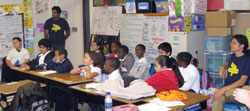
Through the Street Law Program, second-year law students Sree Gadde and Mikhail Petersen help moderate a mock trial for students at Washington's Francis Junior High School.
Lesley Fredin
“We canvass areas around the time that workers are leaving and approach them about doing the survey,” he says.
Mr. Taylor has also done pro bono work for Street Law, a GW program that sends students into D.C. schools to teach schoolchildren about the law.
“It was designed to educate students from inner-city communities about their legal rights—for many of them, the law has been an unfavorable influence in their lives,” Mr. Taylor says.
“Last year we taught about equal protection under the law, what programs the government can institute that have racial preferences, or what laws the government cannot make on race or gender,” Mr. Taylor says. This year, his third year volunteering for the project, he works about an hour a week, or one class period, teaching middle school students about First Amendment rights.
In addition to these two pro bono posts, Mr. Taylor also occasionally volunteers for the American-Arab Anti-Discrimination Committee, where he worked as an employee during the summer of 2008 and has returned as a volunteer. At the committee, he does client consultation for people with immigration or employment discrimi-nation issues.
Being involved in the community and giving back has been a motivator for Mr. Taylor’s abundant service work.
“On a human basis, pro bono work keeps me down to earth,” Mr. Taylor says.
His experiences have also helped to inform his career path. Mr. Taylor had an eye on a public interest career since entering law school, and doing pro bono work has affirmed his interest. With public interest work, he’ll be an advocate for disadvantaged people, a career path that he finds more appealing than the typical lawyer path.
“In pro bono work, you’re exposed more to the reality of the need for legal reform,” Mr. Taylor says. “You learn that often the legal remedies are not the most viable alternative. There are a host of other problems that people have when they’re seeking help.”
Read more about pro bono work by alumni and faculty members in the next issue of GW Law School Magazine.
Putting Public Service to the Career Test
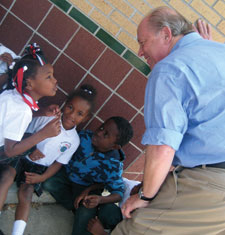 Bill Shore, JD ’81, works to prevent childhood hunger as executive director of the nonprofit Share Our Strength.
Bill Shore, JD ’81, works to prevent childhood hunger as executive director of the nonprofit Share Our Strength.
When the Ethiopian famine exploded into a state of crisis around 1984, Bill Shore, JD ’81, decided that he needed to do something more hands on with the humanitarian issue. Today, he is working harder than ever to make sure there is food on people’s tables.
Mr. Shore is the cofounder and executive director of Share Our Strength, a nonprofit that weaves together a net of community groups, activists, and food programs to provide hungry children with nutritious food where they live, learn, and play. Since it began in 1984, Share Our Strength has raised over $245 million and provided support for more than 1,000 nonprofits working to end hunger.
For his commitment to service, Mr. Shore won the J. William Fulbright Distinguished Public Service Award during October’s Alumni Weekend. Bestowed by the George Washington Law Alumni Association, the award honors an alumnus or alumna who has performed outstanding public service throughout his or her career. The award’s namesake, Sen. J. William Fulbright, LLB ’34, exemplified the ideals of public service throughout his career as attorney, professor, university president, U.S. representative, U.S. senator, citizen, and statesman. Past recipients of the award include Montgomery County Executive Isaiah “Ike” Leggett, LLM ’76; former Secretary of the Treasury John W. Snow, JD ’67; and U.S. Sen. Harry Reid, JD ’64.
“I thought it was terrific to be recognized for a course that is not the typical law school path,” Mr. Shore says. “Fulbright once said, ‘Democracy is an act of faith.’ It’s meant literally but also broadly—choosing a different path can be an important act of faith. The award is a real thrill.”
Mr. Shore travels the country to meet with governors, mayors, policymakers, and 65 Share Our Strength staff members around the country. On a typical mid-October week, he met with four foundations interested in investing in Share Our Strength’s work and flew to a dinner in Boston with top chefs who were donating their skills to raise $50,000 to $60,000 for the cause.
Mr. Shore, who splits his time between Washington, D.C., and Boston, also serves as chair of Community Wealth Ventures, a for-profit subsidiary of Share Our Strength that counsels other foundations and nonprofits on how to boost their charitable income by operating a for-profit business. “There’s no reason that a nonprofit can’t own a business,” Mr. Shore says. “A lot of nonprofits don’t know that they’re allowed to do this, and a lot of nonprofits have assets that can be leveraged into revenue. Just operating on donations can be pretty limiting. There are just not enough charitable dollars to go around.” Community Wealth Ventures works with nonprofits ranging from school districts to art museums, Mr. Shore says.
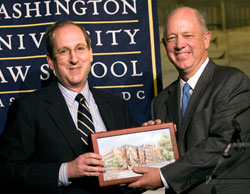
Dean Frederick Lawrence awards Mr. Shore the J. William Fulbright Distinguished Public Service Award in October.
Dave Scavone
The best part of his work is “the fact that we empower a lot of other individuals to get involved in the community,” he says. “We work with more than 10,000 chefs and restaurateurs who now realize the impact they can have on the community teaching nutrition to low-income families.”
Before launching a career in public service, Mr. Shore worked for 13 years on the Hill serving on the senatorial and presidential campaign staffs of former U.S. Sen. Gary Hart (D-Colo.) and as chief of staff for former U.S. Sen. Robert Kerrey (D-Neb.). He learned about legislation as well as how to take good ideas and make good public policy.
Going from the Hill to the public service world “felt like a natural transition,” Mr. Shore explains, because he could apply what he learned on the Hill to working on a problem such as hunger.
When Mr. Shore was working with Sen. Hart, he attended GW Law School at night for four years, gaining important skills and knowledge to help him in the nonprofit business.
GW professors, he recalls, taught him how to develop an argument. “We had to think about issues from every different angle and were sometimes put on the spot to defend a position against every possible attack,” he says. These skills come in handy in the nonprofit world when he’s trying to be as persuasive as possible to gain support for public issues.
“When we work with issues like hunger, we have to build a case or argument for it and anticipate weaknesses for it,” he explains. “Law School was great training for that.”
—Carrie Madren



